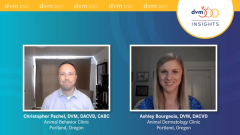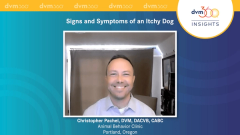
Minimum Dermatologic Database of an Itchy Dog
Episodes in this series

Ashley Bourgeois, DVM, DACVD: It’s probably important for us, as we’re talking about itchy dogs, to discuss the minimum database of an itchy dog. Dermatologically, unless you want to do some psychologies, I’m going to guess that it’s probably something that I should cover. As far as minimum database, I’m always an advocate for cytology everything. The big reason is, in a majority of these cases, we’re looking for things like secondary infection. If I find something like malassezia or a pyoderma under the microscope, there is a significant portion of dogs for whom you just treat that infection and there’s going to be some portion of their pruritus that gets better. That doesn’t mean I always just treat the infection, because depending on that history and the severity of the infections, severity of the lesions, we might need to use other antipruritic just to address the allergic itch. But if I just put them on the antipruritic, and it doesn’t matter what it is, Apoquel, Cytopoint, steroids, Atopica. If you don’t address the itch that’s associated with the infection, they don’t seem to get better.
That goes for rechecks, and that goes for cases I’ve managed for years. Even my cases break with flares, and we need to identify those. We don’t want to give up on crucial antipruritic therapy if it truly would be effective for that pet, just because of a flare that happened because summer came, or twice a year they get a little infection that we can get a hold of. That’s also going to lean into why the multimodal approach is so crucial for these dogs, because things like bathing and topical therapy can really help minimize those outbreaks, so we’re not giving up on really important therapy.
But then we have to think about other diagnostics too. I love cytology, obviously. But there are other things we have to be really thoughtful of. Skin scrape, certainly we don’t want to miss a case of sarcoptic mange. There’s a form of demodex that can be itchy. Not the classic, demodex canis, that we think about. But skin scraping to find those pruritic mites can be important because even if we put them on an antipruritic and treat their infection, if we’re worried that they have scabies, they’re not going to get better. In fact, they might get worse because you’re just given more time for those mites to keep replicating. Certainly, things like dermatophyte cultures. I don’t dermatophyte culture every case that comes in the door by any means, but when I’m suspicious of a case that’s not responding, I see a lot of pyogranulomas inflammation under the microscope to see if there are other pets in the household that are affected or there’s people. I recently had a person that had a rash from their dog having dermatophyte. Going back to the history, if I’m seeing nasal lesions, and they’re digging in rodent holes, I’m worried they could have trichophyton. Then that can be important to identify.
Basic things. We always used to say, “Scrape, look, smear.” You’re doing your cytology, doing your skin scrapes. Then doing your dermatophyte culture, you feel like it’s warranted in that case, it can be important. Finally, we cannot ignore that some of these cases need to be biopsied. I have biopsied cases that end up coming back as allergies. Sometimes you get terrible erythematous scaly skin, and you don’t want to miss something like a random lymphoma case, or a pemphigus case where you can’t tell if it is crusty but there’s not that much infection under the microscope. It’s not wrong to biopsy cases, especially if they’re nonresponsive to therapy, because we don’t want to miss a diagnosis that might not truly be allergies. Then, of course, there are things like cultures and intradermal testing, which we do as specialists. Really homing in on those diagnostics are important. At a minimum, we have to cytology everything, identify the infection, and then scrape, dermatophyte biopsy, depending on where that case falls.
Transcript edited for clarity.
Newsletter
From exam room tips to practice management insights, get trusted veterinary news delivered straight to your inbox—subscribe to dvm360.




